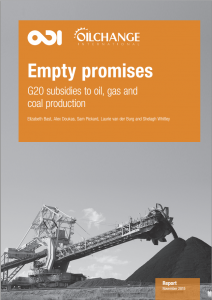Full Title: Empty Promises G20 Subsidies to Oil, Gas and Coal Production
Author(s): Elizabeth Bast, Alex Doukas, Sam Pickard, Laurie van der Burg and Shelagh Whitley
Publisher(s): OilChange International
Publication Date: November 1, 2015
Full Text: Download Resource
Description (excerpt):
G20 country governments are providing $452 billion a year in subsidies for the production of fossil fuels. Their continued support for fossil fuel production marries bad economics with potentially disastrous consequences for the climate. In effect, governments are propping up the production of oil, gas and coal, most of which can never be used if the world is to avoid dangerous climate change. It is tantamount to G20 governments allowing fossil fuel producers to undermine national climate commitments, while paying them for the privilege. This report documents, for the first time, the scale and structure of fossil fuel production subsidies in the G20 countries. The evidence points to a publicly financed bailout for some of the world’s largest, most carbon intensive and polluting companies.
It finds that, by providing subsidies for fossil fuel production, the G20 countries are creating a ‘lose-lose’ scenario. They are pouring large amounts of finance into uneconomic, high-carbon assets that cannot be exploited without driving the planet far beyond the internationally agreed target of limiting global temperature increases to no more than 2ºC. At the same time, they are diverting investment from economic low-carbon alternatives such as solar, wind and hydro-power.
The scale of G20 fossil fuel production subsidies calls into question the commitment of governments to an ambitious deal on climate change. Several countries have scaled up their pledges to reduce greenhouse gas emissions, but continued subsidies for fossil fuel production raise serious concerns about these pledges and could undermine the prospects for an ambitious climate deal. As well as phasing out national subsidies, G20 governments have a tremendous opportunity to meet the climate challenge by shifting the investment of state-owned enterprises and public finance away from fossil fuel production, towards clean energy. It is one thing, however, for nations to make pledges, it is another for them to take the most important and necessary step: withdrawing their support from the fossil fuel industry.
